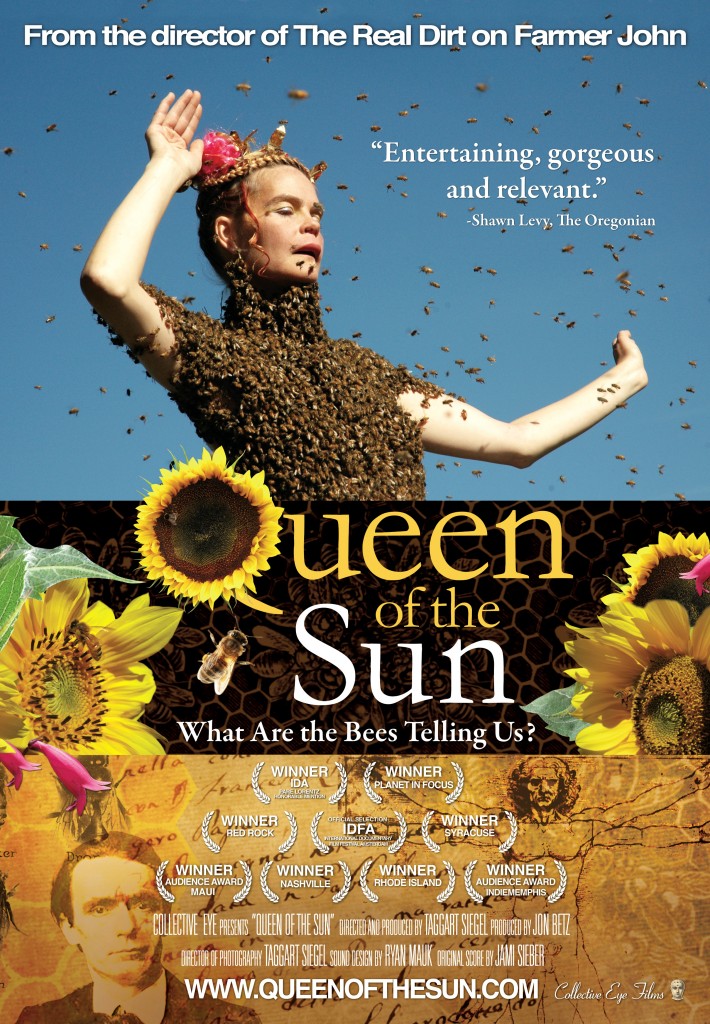Queen of the Sun- a MUST see movie
Disclosure: This post may contain affiliate links
This movie raises an ethical question for vegans, as well as non-vegans, to consider and is a profound, alternative look at the bee crisis. A MUST SEE for everyone.
What's in this post
 “QUEEN OF THE SUN: What Are the Bees Telling Us? is a profound, alternative look at the bee crisis. Taking us on a journey through the catastrophic disappearance of bees and the mysterious world of the beehive, this alarming and ultimately uplifting film weaves together an unusual and dramatic story of the heart-felt struggles of beekeepers, scientists and philosophers from around the world.”
“QUEEN OF THE SUN: What Are the Bees Telling Us? is a profound, alternative look at the bee crisis. Taking us on a journey through the catastrophic disappearance of bees and the mysterious world of the beehive, this alarming and ultimately uplifting film weaves together an unusual and dramatic story of the heart-felt struggles of beekeepers, scientists and philosophers from around the world.”
Colony Collapse Disorder. If you haven’t heard, this is how scientists are describing the phenomenon where bees from a hive or colony abruptly die or disappear. That’s right. They just disappear. They leave the hive in search of nectar and never return. While this is still being studied, evidence points to pesticide use, GM crops, mono-culture (un-diversified agriculture), pathogens, beekeeping, and electromagnetic radiation. Whatever the cause, the fact is it’s happening, and because it’s happening, life world-wide is threatened- all animals rely on plants for survival- directly or indirectly. Even from a purely selfish human perspective, we should be very worried because our food supply is directly dependent upon bees pollinating crops. Less crops equals less food, which equals a higher grocery bill.
A recent review by Roger Ebert of the new documentary film, Queen of the Sun, provides a stirring account of the movie. I encourage you to read it. He begins with this:
In the Central Valley of California, there are 500,000 acres of almond trees. All almond trees. Nothing but almond trees. This is wrong. It is not natural. For these trees to bear almonds, they must be pollinated. But bees cannot live there, for there is nothing to sustain them when the trees are not in blossom. So hives containing millions of bees must be trucked more than a thousand miles, and then trucked back again.
As a vegan, this rattled my conscience. After all, almonds are a part of my diet. We all know of the nutritional benefits of this plant. But the fact is, the almond crop of the state of California is the size of Rhode Island- mono-culture at it’s finest. Nothing but almond trees for miles, means nothing but almond trees. No diversity leads to some serious pesticide use. Believe it.
Pesticides are one of man’s most insidious creations. If you’re one of the few left who haven’t done so, please read Silent Spring by Rachel Carson. It is the primer on environmental contaminants made by humans. Although written nearly 50 years ago, it’s totally relevant today due, in part to the fact, it’s premise has been proven and re-proven but still conveniently ignored by governments and industry. The book is a case study on DDT, a pesticide developed as a result of World War II. Basically, DDT kills life, and not just the life it was intended to kill. It, like most other pesticides, persists in the environment for years and builds up in the tissues of animals. DDT has been banned by countries but is still used by others. Humans have developed a slew of other chemical and biological agents to use on pests who destroy our mega-swaths of crops. These pesticides often do to bees what they do to other animals including humans, and that is disrupt hormones. This leads to health problems such as cancer and premature mortality.
This raises an ethical question for vegans, as well as non-vegans, to consider. Should we be supporting the California almond industry, more specifically, the Blue Diamond Almond Cooperative? You can bet that nearly every almond sliver and swig of almond milk you put in your mouth comes from the (world’s largest tree nut) company focused on, “expanding almond consumption worldwide.”
To quote Mr. Ebert again, “Would it kill a corporation to set aside some tracts of land for flowers and vegetables?” I am going to see this film, and you should too.






i’ll definately have to check this flik out! i love bees.
Its a ‘have 2 see it’ !!! It reminds me here in Brazil we’re having the same problem… Mankind forgets the answer is in the nature, not in the labs!
Congrats!!
Thanks for the film recommendation! On a very small scale level, my lawn is full of flowers (what many suburbanites would call “weeds”), and I’m planting more and more flowers (and veggies!) around the landscape every year to welcome back these beautiful little beings.